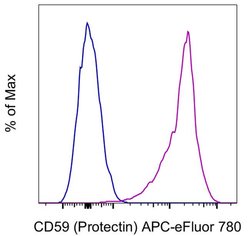Learn More
CD59 (Protectin) Monoclonal Antibody (OV9A2), APC-eFluor™ 780, eBioscience™, Invitrogen™


Mouse Monoclonal Antibody
$402.00
Specifications
| Antigen | CD59 (Protectin) |
|---|---|
| Clone | OV9A2 |
| Concentration | 5 μL/Test |
| Applications | Flow Cytometry |
| Classification | Monoclonal |
| Catalog Number | Mfr. No. | Quantity | Price | Quantity & Availability | |||||
|---|---|---|---|---|---|---|---|---|---|
| Catalog Number | Mfr. No. | Quantity | Price | Quantity & Availability | |||||
47-059-642
 
|
Invitrogen™
47059642 |
100 Tests |
Each of 1 for $402.00
|
|
|||||
Description
Description: This OV9A2 monoclonal antibody reacts with human CD59, which is also known as Protectin. This GPI-linked membrane glycoprotein shares structural homology with the murine Ly-6 superfamily. CD59 is expressed on all human lymphocytes, monocytes, granulocytes, and erythrocytes. This protein is also expressed on non-hematopoietic cells, including endothelial cells and neurons. By binding the complement components C8 and C9, CD59 inhibits assembly of the membrane attack complex and cytolytic activity by complement. CD59 interacts with CD2 to modulate T cell adhesion, and also plays a role in T cell activation. Finally, altered expression of CD55 and CD59 on human peripheral blood cells has been observed in patients with systemic lupus erythematosus (SLE). Crossblocking studies indicate that the OV9A2 monoclonal antibody binds the same epitope as MEM-43. Applications Reported: This OV9A2 antibody has been reported for use in flow cytometric analysis. Applications Tested: This OV9A2 antibody has been pre-diluted and tested by flow cytometric analysis of normal human peripheral blood cells. This may be used at 5 μL (0.125 μg) per test. A test is defined as the amount (μg) of antibody that will stain a cell sample in a final volume of 100 μL. Cell number should be determined empirically but can range from 10^5 to 10^8 cells/test. APC-eFluor 780 emits at 780 nm and is excited with the Red laser (633-647 nm).
CD59 (Protectin) is a small (18-20 kDa) GPI-anchored ubiquitously expressed inhibitor of the membrane attack complex (MAC). CD59 is the key regulator that preserves the autologous cells from terminal effector mechanism of the complement cascade. CD59 also associates with C5b-8 complex and counteracts appropriate formation of cytolytic pore within the plasma membrane. Further, CD59 is a low-affinity ligand of human CD2, causes T cell costimulation, and is involved in lymphocyte signal transduction. CD59 is a potent inhibitor of the complement membrane attack complex, whereby it binds complement C8 and/or C9 during the assembly of this complex, thereby inhibiting the incorporation of multiple copies of C9 into the complex, which is necessary for osmolytic pore formation. Mutations in this gene cause CD59 deficiency, a disease involving hemolytic anemia, thrombosis, and cerebral infarction. Multiple alternatively spliced transcript variants of CD59 have been identified.Specifications
| CD59 (Protectin) | |
| 5 μL/Test | |
| Monoclonal | |
| Liquid | |
| RUO | |
| P13987 | |
| CD59 | |
| Primary | |
| 4°C, store in dark, DO NOT FREEZE! | |
| CD59 |
| OV9A2 | |
| Flow Cytometry | |
| APC-eFluor 780 | |
| Mouse | |
| Human | |
| 966 | |
| IgG1 κ | |
| Affinity chromatography | |
| Antibody |
The Fisher Scientific Encompass Program offers items which are not part of our distribution portfolio. These products typically do not have pictures or detailed descriptions. However, we are committed to improving your shopping experience. Please use the form below to provide feedback related to the content on this product.
